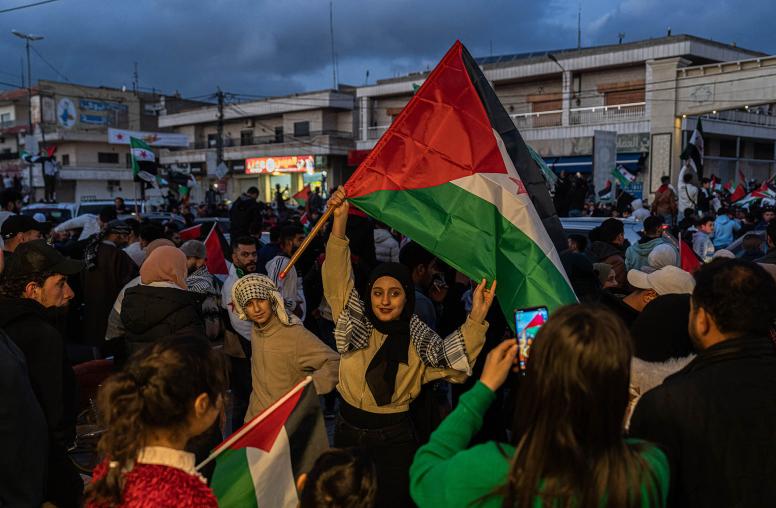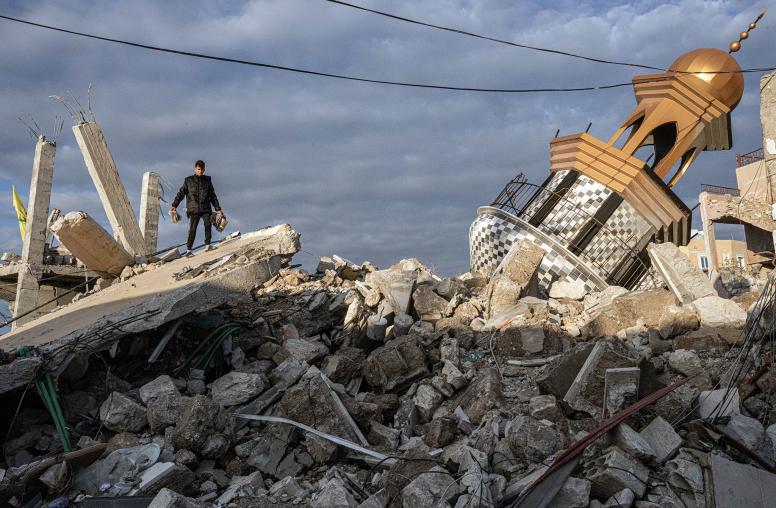Mona Yacoubian on Lebanon’s Dangerous Meltdown
As Lebanon teeters on the edge of total state collapse, USIP’s Mona Yacoubian says very little stands in the way of malign actors and possibly a new migrant crisis in the region: “The lights are truly blinking red … if the army collapses, then, honestly, I think all bets are off.”
On Peace is a weekly podcast sponsored by USIP and Sirius XM POTUS Ch. 124. After a brief hiatus, On Peace is available again on a weekly basis. Each week, USIP experts tackle the latest foreign policy issues from around the world.
Transcript
Julie Mason: I'm Julie Mason, you're listening to SiriusXM. Mona Yacoubian is senior advisor at the United States Institute of Peace. You can follow her on Twitter @myacoubian. Here to talk about the situation in Lebanon. Mona, welcome back.
Mona Yacoubian: Thank so much, Julie. Good to be with you.
Julie Mason: So, Lebanon on the brink of a historic breakdown, this is happening a little bit under the radar.
Mona Yacoubian: You know, it is, but when you consider how significant this crisis is, I mean, the lights are truly blinking red here. This is a country that's truly on the verge of total collapse. We've seen it experience multiple crises over the last year and a half, starting with a financial collapse that led to basically the meltdown of the currency, their lira has lost 90% of its value that has triggered, as you could imagine, incredible inflation. This is a country that imports 80% of its needs and so you're seeing things like food prices rise 400%. Just yesterday, they raised bread prices again.
Mona Yacoubian: All of this is hitting the Lebanese people in a significant way. This was once a very solid middle income country. You now have more than 50% of the Lebanese people who are living below the poverty line. So it's a crisis of historic proportions.
Julie Mason: That's drastic. Now, how much does the government budget bear responsibility for what's happening?
Mona Yacoubian: The government bears significant responsibility, largely because of the role that that that the financial sector appears to have played in precipitating this crisis to begin with and what's been called essentially a "Ponzi scheme" economy. But then, as things started to get bad, the inaction of the government, the lack of urgency, is really just astonishing. The World Bank has said that Lebanon is now in what they call a deliberate depression, pointing to the government and saying that the government's inaction in this, at this point, is to blame.
Mona Yacoubian: The country is also suffering, on top of everything else, from a political crisis because after the Beirut port explosion of last August, the government collapsed, and they have now been in a stalemate for 10 months, they've not been able to form a new government. So, yeah, the government, unfortunately, stands very much responsible for the suffering of everyday Lebanese.
Julie Mason: You know, and we've seen a lot of protests there and a lot of strikes and people in the street. It seems like quite a volatile situation.
Mona Yacoubian: I think that's exactly right. I mean, yesterday, for example, there were gunfights in gas lines, people have been lining up for hours just to get maybe a quarter of a tank of gas. So people are incredibly frustrated and angry and so yes, you're seeing protests you're seeing fights you're seeing as I said, even gunfights; but Julie, I think what's even more concerning is as the economy implodes, there are real concerns that the army could collapse and that is the one institution that is still holding things together, but as you know, as salaries, military salaries plummet, the chief of the army has raised concerns that they're in a situation that is not tenable. And if the army collapses, honestly, then I think all bets are off.
Julie Mason: You write that it could lead to chaos and the total breakdown of law and order.
Mona Yacoubian: Exactly right. This is a country that's not, you know, that has suffered through a very significant civil war and I think there's a real fear that it could go back to that kind of almost Somalia on the Mediterranean, if you will.
Julie Mason: Oh, that's grim. Alright, so what are what are the strategic implications for the United States? And what is the State Department saying?
Mona Yacoubian: Well, I think the strategic implications for the U.S. are significant for several reasons. I mean, first of all, what we know from across the world is that when states collapse, you see major security vacuums open up and in the case of Lebanon, there is no shortage of what the U.S. government would call "malign actors" who could take advantage of that. First and foremost is Hezbollah, the Iranian-backed armed group that has the preponderance of power on the ground already, they are best positioned to weather a total state collapse. So you would see therefore an ally of Iran benefit from this. But you also have the possibility of Sunni extremist groups, groups like ISIS, Al Qaeda and others, who historically take advantage of this kind of chaos, to sort of take, you know, to use those sort of security vacuums and plan, you know, activities and do other things.
Julie Mason: Well, and they also use money to recruit; if people if people can't feed their families, suddenly here comes ISIS with a with a bag full of money for 'ya.
Mona Yacoubian: Yeah, absolutely, that's exactly right, and and then, though, in desperation, you also have the possibility of massive displacement of refugee flows. And, you know, people should know, Lebanon hosts the largest number of refugees per capita in the world. So they have an estimated one and a half million Syrian refugees and the concern is, if things go, you know, Lebanon completely melts down, in desperation, you could see people taking, we've seen this already in the past, people taking boats to Cyprus, you could have another one of these major refugee influxes into Europe, which, of course, then has a slew of implications for the U.S. and the West in general.
Julie Mason: Wow, alright, so, um, what are the prospects for Lebanon? Well, I guess we should talk about the region as well. These refugees, where would they go?
Mona Yacoubian: Well, again, it's you know, we have seen just trickles here and there, but where they would likely go is is Europe, and the closest is Cyprus. It's possible that you could see sort of not unlike what we saw in the summer of 2015, people may remember there was a massive flows of refugees, in that case, Syrian and Afghan, into Europe. It's possible that we could see something like that again and so that would be obviously a real concern.
Julie Mason: So what should the international community be up to with regard to Lebanon right now?
Mona Yacoubian: Well, you know, it's clearly, as I said, in state of emergency, and I think there are really two things the international community could do. First and foremost is provide immediate humanitarian assistance to the very vulnerable Lebanese and refugee populations. You already have the World Food Program announcing it will triple its assistance, but that's just not going to be enough and, so, I think it would make sense, for example, for the United Nations to launch an appeal and seek additional funding for humanitarian assistance for the most vulnerable in Lebanon.
Mona Yacoubian: The second is going back to this issue of the government's inaction, its refusal to do anything, but rather for the political elite in Lebanon who are protecting their perks and standing by and watching the country burn. Here, I think it's important for the international community to apply concerted pressure on the Lebanese political class to demand that they form a government. This could be done through U.S., French, Gulf country leaders, who, you know, in addition to the carrots of an IMF rescue package, if they do form a government and implement reforms, great. If they continue to be recalcitrant, then I think it's important to take some more coercive measures, things like targeted sanctions, and here I mean, asset freezes on some of these corrupt officials, travel bans, other kinds of things that very specifically target this corrupt political class in Lebanon that really, frankly, holds much of the blame for the current suffering.
Julie Mason: Mona Yacoubian is senior advisor at the United States Institute of Peace. You can follow her on Twitter @myacoubian. Dire situation in Lebanon. Mona, thank you so much.
Mona Yacoubian: Thanks for having me. Julie.
Julie Mason: Great to talk to you.



